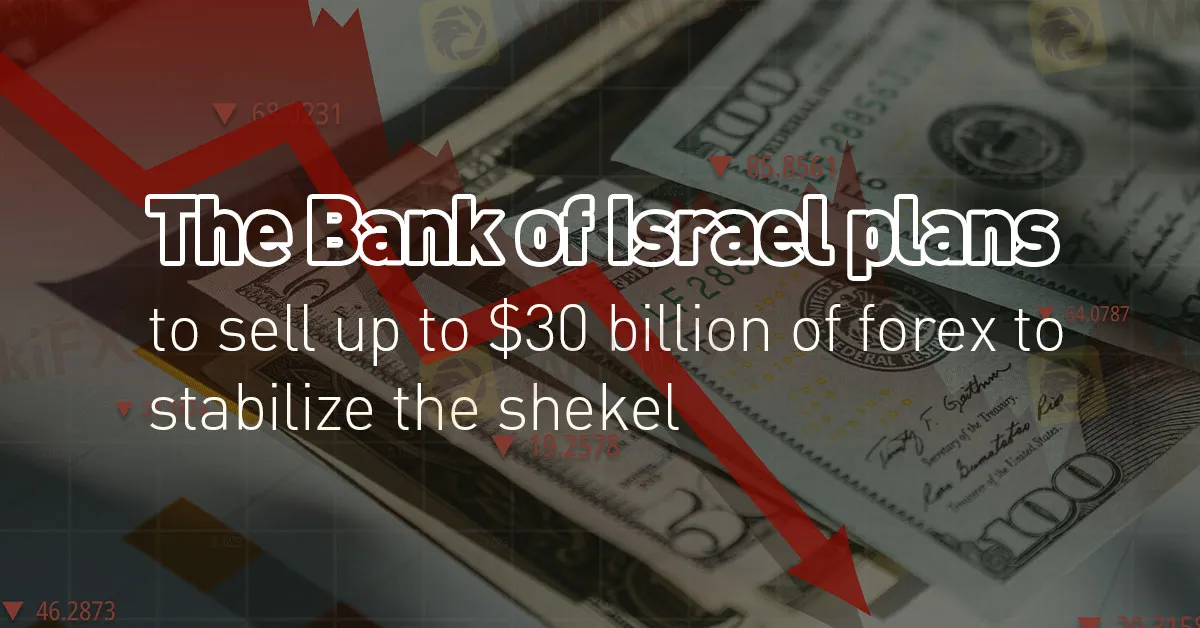简体中文
繁體中文
English
Pусский
日本語
ภาษาไทย
Tiếng Việt
Bahasa Indonesia
Español
हिन्दी
Filippiiniläinen
Français
Deutsch
Português
Türkçe
한국어
العربية
The Bank of Israel plans to sell up to $30 billion of forex to stabilize the shekel
Abstract:The Bank of Israel made a historic announcement on Monday, revealing its plans to conduct its first-ever sale of foreign currency in the open market. This move, involving the sale of up to $30 billion in foreign exchange, is aimed at preserving stability amid the ongoing conflict with Palestinian militants in Gaza.

The Bank of Israel made a historic announcement on Monday, revealing its plans to conduct its first-ever sale of foreign currency in the open market. This move, involving the sale of up to $30 billion in foreign exchange, is aimed at preserving stability amid the ongoing conflict with Palestinian militants in Gaza.
As news of this decision broke, the Israeli shekel experienced a sharp decline of 2.8% against the US dollar, reaching a rate of 3.95 shekels to the dollar—its weakest performance since February 2016. This marked the most significant one-day movement in the shekel's value since March 2020.
Golan Benita, head of the Bank of Israel's markets department, addressed a news conference, stating, “We are in an unprecedented security situation, and our estimate was that the market could get to a situation of divergence without the announcement of our intervention.” This decision was prompted by concerns that, given the ongoing conflict and political turmoil, the shekel could depreciate significantly, exacerbating market uncertainty.
Before the local market opened for trading, the shekel's exchange rate had surged to as much as 4.3 shekels per dollar during overnight trading in Asia. Benita explained that the central bank's intervention was vital to increase market certainty and mitigate the risk of excessive market reactions, ensuring the regular functioning of financial markets.
While there are currently no plans to exceed the $30 billion limit in foreign exchange sales, the Bank of Israel maintains a substantial reserve, which provides room for further support to the economy during emergencies. The primary focus at present is to maintain market stability and normal operations.
Citi economists noted, “Despite our expectation of a weaker shekel in the medium term... we do not expect further sustained bouts of shekel weakness.” However, JPMorgan expressed the view that the central bank might have to contend with prolonged pressure on the currency. “Given potential passthrough to inflation as well as sentiment impact, we think levels near 4.00 may see more substantive FX selling by BoI,” said Anezka Christovova of JPMorgan.
In response to the situation, Israeli stock and bond prices had initially declined by 7% following an incursion by Hamas gunmen into Israeli territory. However, on Monday, key Tel Aviv share indexes rebounded, closing 0.7% to 1% higher in a day characterized by strong turnover.
Furthermore, the Bank of Israel announced its intent to provide liquidity through swap mechanisms in the market, amounting to up to $15 billion. The central bank remains vigilant, monitoring market developments and maintaining its commitment to utilizing available tools as necessary.
Israel's fiscal resilience is underscored by its forex reserves, which have surpassed $200 billion—equivalent to nearly 40% of its GDP. These substantial reserves have been accumulated since 2008 to manage the shekel's strength and safeguard the competitiveness of Israeli exporters, particularly within the booming tech sector.
While the Bank of Israel's recent intervention is a rare occurrence, it reflects the country's proactive stance in ensuring market stability during times of crisis. As evidence of investor confidence in Israel, the government successfully raised 2 billion shekels ($508 million) through bond issuance on Monday, even amidst the ongoing emergency.

Disclaimer:
The views in this article only represent the author's personal views, and do not constitute investment advice on this platform. This platform does not guarantee the accuracy, completeness and timeliness of the information in the article, and will not be liable for any loss caused by the use of or reliance on the information in the article.
Read more

The One Fear That’s Costing You More Than Just Profits
The fear of missing out (FOMO) is NOT what you think it is! Read the three lesser-discussed components that contribute greatly to FOMO trading!

Bitpanda Secures Full Broker-Dealer License in Dubai
Bitpanda has officially obtained a full broker-dealer license from the Dubai Virtual Assets Regulatory Authority (VARA), marking a significant milestone in its international expansion. This approval, which follows preliminary authorization granted three months earlier, enables the European digital asset exchange to introduce its comprehensive suite of virtual asset services to investors in the United Arab Emirates (UAE).

RM457,000 Forex Fraud: Court Grants Conditional Release, Is Justice Delayed?
A Malaysian magistrate’s court has issued a discharge not amounting to acquittal (DNAA) for two former directors of an investment company implicated in a forex investment fraud case involving RM457,735.50.

Gold Surges to New Highs – Is It Time to Buy?
Recently, gold prices have once again set new records, surpassing $3,077 per ounce and continuing a four-week winning streak. Is It the Right Time to Invest?
WikiFX Broker
Latest News
Why Are Financial Firms Adopting Stablecoins to Enhance Services and Stability?
Experienced Forex Traders Usually Do This Before Making a Lot of Money
Octa vs XM:Face-Off: A Detailed Comparison
When High Returns Go Wrong: How a Finance Manager Lost RM364,000
Bridging Trust, Exploring Best—WikiEXPO Hong Kong 2025 Wraps Up Spectacularly
Fidelity Investments Explores Stablecoin Innovation in Digital Assets Sector
Interactive Brokers Expands Crypto Trading with Solana, XRP, Cardano, and Dogecoin
SEC Ends Crypto.com Probe, No Action Taken by Regulator
Why More People Are Trading Online Today?
Gold Surges to New Highs – Is It Time to Buy?
Currency Calculator







